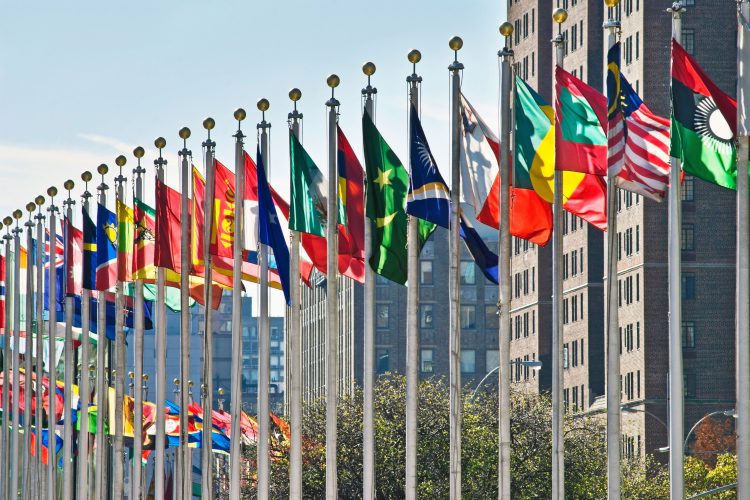Collaborating across borders and barriers
- Like
- Digg
- Del
- Tumblr
- VKontakte
- Buffer
- Love This
- Odnoklassniki
- Meneame
- Blogger
- Amazon
- Yahoo Mail
- Gmail
- AOL
- Newsvine
- HackerNews
- Evernote
- MySpace
- Mail.ru
- Viadeo
- Line
- Comments
- Yummly
- SMS
- Viber
- Telegram
- Subscribe
- Skype
- Facebook Messenger
- Kakao
- LiveJournal
- Yammer
- Edgar
- Fintel
- Mix
- Instapaper
- Copy Link
Posted: 20 October 2021 | Erica Sheward | No comments yet
Following the UN Food Systems Summit in September 2021, Erica Sheward, Director, Global Food Safety Initiative at The Consumer Goods Forum, discusses ways we can help ensure safe food for everyone and highlights key takeaways from the conference.


The Secretary General recently convened the United Nations Food Systems Summit (UNFSS) in New York, following a year like no other and in the context of huge interest in the sustainability of food systems and desire to tackle this issue from the industry and world governments.
Known as ‘the people’s summit’, its primary aim was to deliver progress on all 17 Sustainable Development Goals (SDGs) and to tackle hunger, nutrition, environmental sustainability and inequality issues in the global food system. Worldwide, more than two billion people don’t have enough to eat, while two billion are overweight or obese, and nearly a third of the food that gets produced ends up discarded, according to the UN.
Alongside this, food systems are rapidly being impacted by a changing climate. With less than a month to go until COP26 begins in Glasgow, the appetite for bold and sustained commitments has never been stronger. However, many have criticised the lack of decisive action to help meet the target of ending world hunger by 2030.
At the heart of equitable and sustainable food systems is food safety. Everyone has the right to access safe and nutritious food. Yet an estimated 600 million people each year fall ill after eating contaminated food, and foodborne diseases affect people of all ages, particularly children aged under five and people in low-income countries. Concerns over food safety have also been exacerbated by the pandemic, making it difficult to comprehend the absence of any dedicated action track focused just on Food Safety from the Summit.
At The Consumer Goods Forum, through our work in the Global Food Safety Initiative (GFSI), we understand that we need markets that can deliver food safely, no matter where in the world the consumer is. We also recognise how intrinsically linked food safety and sustainable food systems are. Several SDGs influence how safe and nutritious our food is, such as SDG 1 to reduce poverty, SDG 2 to end hunger, SDG 8 to create decent work and economic growth and SDG 12 to ensure responsible consumption and production. SDG 17, on the power of partnerships, is also essential because collaboration is fundamental when it comes to food safety and our work aims to deliver action on all of these.
Clarity and consistency around food safety is very important – and a lot of work is being done on benchmarking and harmonisation to encourage mutually-recognised certification programmes across the industry, enabling a simplified “once certified, accepted everywhere” approach.
GFSI has also developed tools to provide a pathway towards GFSI-recognised certification for companies with less sophisticated food safety systems. This set of guidance and implementation tools, known as the GFSI Global Markets Programme, sets out how companies who want to improve their food safety systems as they embark on a journey towards certification can meet the challenge. This has proven especially important in helping to raise the food safety bar in countries around the world and provide access to markets that have been, for many years, out of the reach of small-to-medium business operators.
The Summit helped highlight to the world that we need a new system for how we produce, consume and think about food. We must catalyse on the attention the UNFSS has brought to this issue. GFSI’s Government-to-Business forum is one way to do this, it enables the private sector, government food safety officials and international governmental organisations to have open discussions around food safety trends, opportunities and challenges. This open collaboration helps us all to continually raise the bar – ensuring systems that can deliver food safely, no matter where in the world the consumer is.
As the Summit demonstrates, it is critical to garner the support of the whole food industry and supply chains, sharing insights and learnings and listening to all those affected.
GFSI is the place where the global food community comes together to collaborate on collective concerns, but we cannot tackle this issue alone. Food safety is not a competitive issue and no one company or country has sole responsibility. Whether it be those involved in producing, selling and serving food; or those involved in monitoring, certifying and regulating food – we can all benefit from collaborating within a global network. We need to move from awareness to action, to ensure stronger food safety systems that are able to feed the growing, global population.
About the author
Erica Sheward is the Director of the Global Food Safety Initiative (GFSI) at The Consumer Goods Forum, a global industry network working with its 400+ member companies to support Better Lives Through Better Business.
Leading the CGF’s work in product safety, Erica is responsible for defining the strategic development roadmap of GFSI, steering Working Groups and Local Groups and overseeing collaborations with key private and public partners. Ultimately, Erica’s vision for GFSI is to further expand and strengthen its ability to lead food safety advancements globally, working towards GFSI’s vision of safe food for consumers everywhere.
Erica is an internationally-renowned expert in food safety management. Prior to joining the CGF, she spent 14 years working for a UK food manufacturer, six years in food safety academia as both a lecturer and researcher, and five years in the UK government’s Office for Product Safety & Standards, among other roles. She puts her rich experience, leadership skills and commitment to continuous improvement at the service of GFSI.
Related topics
Related organisations
Global Food Safety Initiative, The Consumer Goods Forum, United Nations









